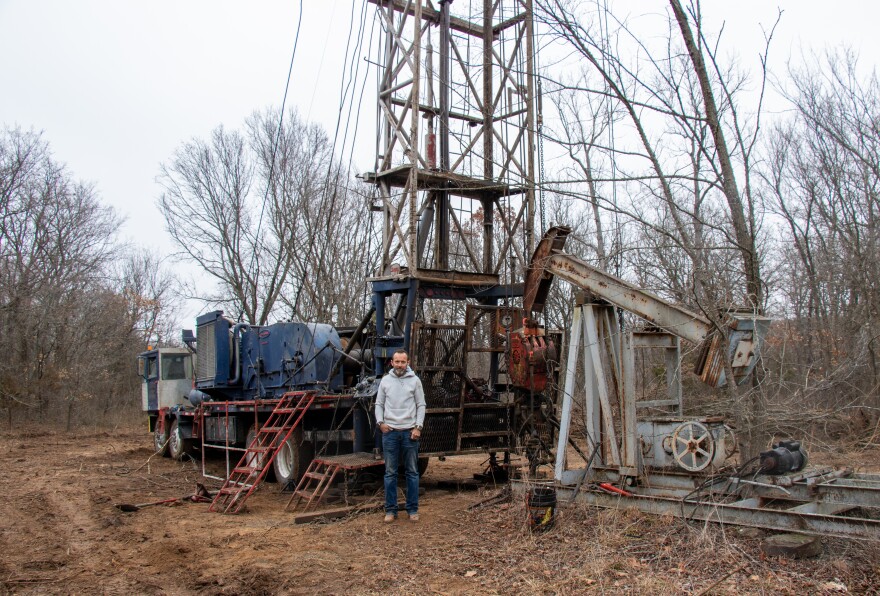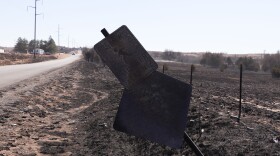A small group of workers bundled in jackets and boots splattered with mud surrounded a pump jack and a 70-foot rig in Glenpool, near Tulsa. In early February, the ground was slick and saturated with rain while they operated the equipment.
Overseen by the Oklahoma Corporation Commission (OCC), the well would later be plugged at certain depths with concrete to prevent it from purging fluids into nearby water or leaking methane, a potent gas known to trap heat in the atmosphere and contribute to climate change.
The well dated back to the 1980s and its owner was unreachable or unknown to the state.
The state agency hired Southern Plains Energy Services, based in Perry, to complete the plugging. The company is run by Rory Jett, who has worked in the oil and gas industry for decades.
“( I) kind of have a passion for it, actually, of trying to clean up these wells and to protect our environment and help the state clean up these farmers' land,” he said.

The site in Glenpool is among 20,406 abandoned oil and gas wells in Oklahoma. They pose an environmental risk the OCC remediates using an excise tax on producers. When a well is no longer active and without an owner, the agency assumes responsibility for it.
The list of abandoned wells is growing alongside the state’s population, and the agency’s funds limit the number of pluggings performed each year.
As part of the 2021 Infrastructure Investment and Jobs Act, the state expected $102 million to augment its state funds and significantly increase abandoned well remediation. But an executive order issued by President Donald Trump on Jan. 20 titled “Unleashing American Energy” halts the disbursement of unspent funds. The directive seeks to support the fossil fuel industry and discourage renewable energy policies and projects in the U.S.
Slowing the plugging industry in Oklahoma, which is fused with oil and gas producers, could be collateral damage should the funds be permanently withheld.
“We actually exhausted all of our state funds in the last fiscal year, what we call state-funded wells, because we knew we had federal money that would serve as a backup,” said Matt Skinner, a longtime spokesman for the OCC, about FY23.
The agency received an initial payment of $25 million from the grant in 2022 and used nearly all of it to plug 1,123 wells, each of which cost an average of $21,588. Skinner said the OCC also uses the money to comply with requirements from the Department of Interior, which include methane testing and assessing sites for endangered species. The agency estimates it could plug up to 4,700 wells should it receive the full amount with no other stipulations.
The list of abandoned wells expands in Oklahoma
A document submitted to the state legislature this year states the OCC would need more than $574 million to plug all of the abandoned wells in Oklahoma. The estimate doesn’t include money for methane testing or other requirements.
The number of abandoned wells in the state is almost certainly higher than its current count, the document states, but it’s impossible to know the full scope. Many wells drilled decades ago lack documentation and exist out of sight. Still, the OCC’s list is expanding as more people move to Oklahoma and discover the old infrastructure.
“We're seeing neighborhoods go out into what used to be called nowhere land,” Skinner said. “And as they grow, they're running into old abandoned wells and they are not plugged, or they may have been plugged, but they haven't been plugged properly because they were plugged a hundred years ago when no one knew how to do it.”

Some of the OCC’s emergency pluggings have taken workers to wells packed with mud, a common method in decades prior, or materials like firewood and clothing. Some sites are missing parts because they’ve been sold off.
Oklahoma oil and gas producers are required to post a $25,000 bond to prove to the state they can operate wells and care for them upon completion. The state doesn’t limit the number of wells a company can own with the bond, leading small producers with fewer than 30 wells to have the same surety as giants like Devon Energy Corporation.
That low threshold has contributed to several investigations by the OCC into activity from shell companies posing as oil and gas producers.
“We have enough evidence to suggest, certainly, that there are those who are registering as oil and gas operators and getting the go-ahead to be an oil and gas operator, and then by various means, obtaining large numbers of wells, stripping them of their pipe, and then the company they have disappears into the night,” Skinner said.
The issue, which the OCC first mentioned publicly this year, is one of several challenges the state faces as it works down its list of pluggings.
“At this point, everything's on hold,” Skinner said. “We don't know what's going to happen.”

Oklahoma’s plugging industry is impacted by federal decisions
Once a well is assessed by the OCC, licensed pluggers are sought to perform the service. Rory Jett, who also owns oil and gas wells in Oklahoma, said the practice is essential to protecting the state’s environment.
“[Fluid from the well] could get into the creeks, into the lakes, they can affect the wildlife, the farmers' fields, the trees,” he said. “They can do a lot of damage if they're left abandoned, they've got that potential until they're plugged.”
The wells can leak compounds into the air, soil and groundwater nearby. Benzene, toluene, ethylbenzene and xylene are among the substances the federal Environmental Protection Agency lists as potential hazards.
Abandoned wells also present job opportunities in the state, a benefit furthered by federal dollars. But the uncertainty surrounding money from the Infrastructure Law threatens that expansion, Jett said.

“ I employ 30 or 40 employees, and without this funding, we don't have enough work to keep those people busy, to keep their jobs, to feed their families,” he said.
Jett said his company had about 70 employees last year, but fewer dollars and new requirements from the Department of Interior have slowed the process.
“I've had to lay off a couple of crews,” he said.
The funding freeze was challenged by a federal court in early February, which ruled the president violated a previous order. Attorneys general from 24 states also filed a motion to enforce a temporary restraining order against Trump’s action to withhold the grants. As of Feb. 19, the federal funds were not yet released.
Although Jett agrees with the president’s enthusiasm for the fossil fuel industry, he said the decision to withhold the grant hinders the state’s work to clean up after production and leaves the surrounding environment vulnerable.
“Donald Trump has expressed ‘Drill, baby, drill,’ we've heard that phrase through the campaign and through all of that,” Jett said.
“But if we're going to drill, we've got to clean up what we've already got.”
StateImpact Oklahoma is a partnership of Oklahoma’s public radio stations which relies on contributions from readers and listeners to fulfill its mission of public service to Oklahoma and beyond. Donate online.









